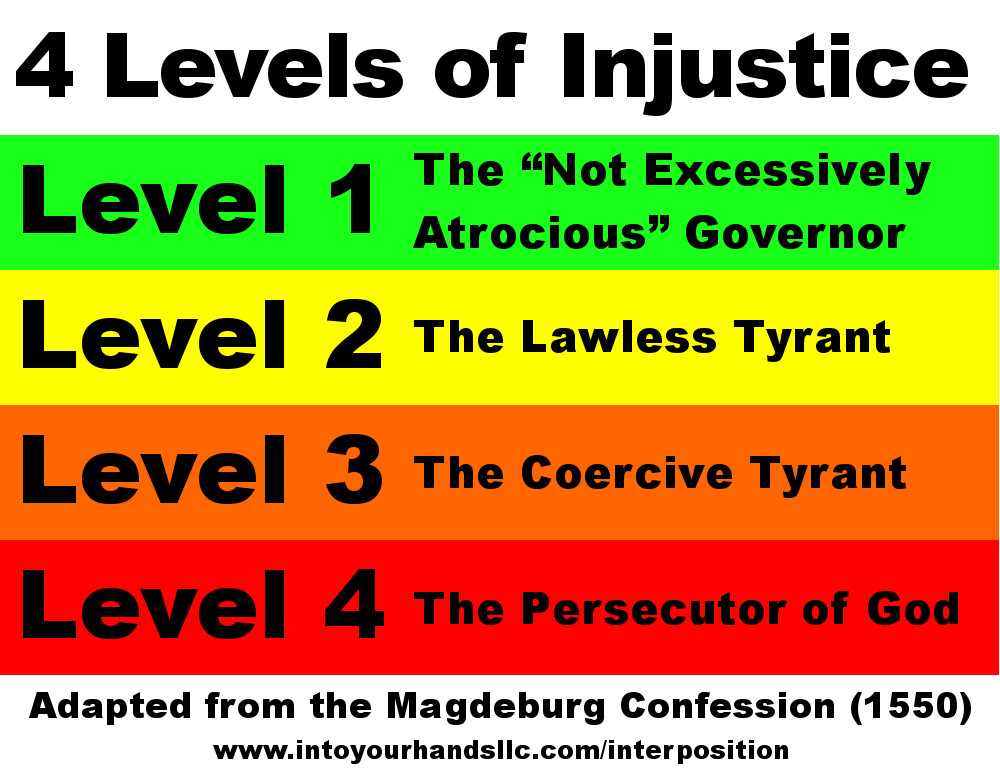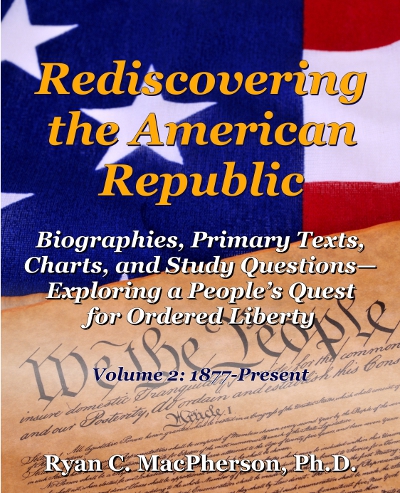Unless a person concedes unlimited authority to the civil government, then there must be a line which, once crossed by a tyrannical governor, affords to those who otherwise would be under that governor’s authority the right, and perhaps even the duty, to resist that governor’s tyranny. But where is that line?

On the one hand, prudence dictates patience. To resist the government on every smallest infraction of one’s rights would lead to a near-perpetual resistance, since no human governor is immune from the vices common to all people. Excessive resistance, with its tendency toward anarchy, no doubt would leave people’s rights even less secure than the occasional vices of an imperfect governor.
On the other hand, “justice too long delayed is justice denied,” as Martin Luther King Jr. wrote from his Birmingham jail cell in 1963. Failure to resist soon enough may result in the loss of any alternative except bondage to the tyrant. As Patrick Henry concluded in his passionate speech to the assembly of colonial Virginia in 1775:
It is now too late to retire from the contest. There is no retreat but in submission and slavery! … I know not what course others may take; but as for me, give me liberty or give me death!
(He spoke these words to urge the appropriation of funds for a military defense of the colony in case the Redcoats attempted in Virginia what they already were doing in Massachusetts.)
A Tale of Two Cities: Philadelphia and Magdeburg
Some room for debate remains as to whether America’s founding fathers acted too early or too late (or whether they should have acted at all), but clearly they intended to act at the appropriate time.
Convening in Philadelphia in 1776, the Second Continental Congress agreed, in the Declaration of Independence, to the principle that “while evils are sufferable” the people should bear with their existing government patiently, but that “a long train of abuses and usurpations, pushing invariably … [to] Despotism” marks the proper justification for a regime change.
Another formulation was developed in the Germany city of Magdeburg in 1550. Like Jefferson, the magistrates of Magdeburg distinguished between patient forbearance in the face of occasional injustice and political resistance in the face of outright tyranny. Unlike the Declaration of Independence, however, the Magdeburg Confession identified four levels of injustice, rather than just two. Finally, whereas the Declaration of Independence appealed to “the laws of Nature and of Nature’s God” and the “history of repeated injuries and usurpations,” the Magdeburg Confession included not only arguments from natural law and human history, but also arguments from Holy Scripture.
Anyone who cherishes liberty today would do well to look beyond the Declaration of Independence to the Magdeburg Confession. That confession provides a more complete and a more solidly grounded defense of political resistance than the declaration. The Magdeburg Confession also specifies a more careful delineation between the time to bear patiently and the time to take political (perhaps even military) action against injustice.
Four Levels of Injustice, and the Proper Response to Each
When one local ruler after another conceded to Holy Roman Emperor Charles V the authority to force Lutheran congregations back into alignment with the Church of Rome, one city in Germany outlasted all others in its refusal to submit. In Magdeburg, civil magistrates and pastors together resolved to hold their ground. On April 13, 1550, they issued the Magdeburg Confession as a final appeal to Charles V against the encroachments of his soldiers and political middle men. The Lutheran confessors made clear that they desired to obey the Emperor and to honor his office of political authority so far as possible, but they also made clear that the Augsburg Interim—a policy requiring Lutheran churches to abandon the theology of their Augsburg Confession in favor of Roman Catholic theology—represented a grave transgression on the part of the Empire. Indeed, they likened Charles V and the Pope to more than a tyrant—to the Antichrist himself.
However flamboyant that conclusion may sound, the fact is plain that the authors of the Magdeburg Confession reached that point through patient exploration of the Scriptures, of the theological writings of Martin Luther, and of the testimony of human experience throughout the ages. (So demonstrates Whitford.) Along the way, they delineated the following four levels of injustice, indicating the appropriate response to each.
Level 1 Injustice: The “Not Excessively Atrocious” Governor
All people, governors included, “by their natural weakness have their own vices and sins, by which, either knowingly or wantonly, they sometimes do injuries, not excessively atrocious, but remediable.” In such cases, the lesser magistrates should “exercise their office by warning them [the offending governors] seriously, and in other civil ways.” However, the lesser magistrates should “bear the harms they can bear without sin, and by no means take up arms themselves.” In brief, the “not excessively atrocious” governor must be borne patiently. (All quotations are from the edition translated by Matthew Colvin.)
Level 2 Injustice: The Lawless Tyrant
In comparison to level 1 injustice, which was just described as “not excessively atrocious,” level 2 injustice involves “atrocious and notorious injuries.” In this instance, the governor violates his own oath to uphold the constitution and the laws of the land, for example, by depriving “life, or spouse, or children, or privilege and sovereignty acquired by inheritance or law.” The Magdeburg confessors here left the matter largely to the individual consciences of the lesser magistrates, noting that God does not compel them to obey the unlawful orders of the lawless tyrant, but also noting that, if possible, it may be better to suffer in Christian patience, yes, “to suffer even injuries of this sort, and to leave vengeance to God, when the injury affects individual men, or a few men; and when the injury is able to be tolerated without sin.”
Level 3 Injustice: The Coercive Tyrant
When the tyranny of a level 2 injustice swells to the point beyond which innocent toleration is possible, it becomes a level 3 injustice. Here “an inferior magistrate is so forced to certain sin, that he is not able to suffer it without sin if defense is omitted.” Drawing the line between levels 2 and 3 admittedly requires “accurate and true judgment.” In both levels, “the authors of such injuries properly become and are called tyrants.” The difference between them is a matter of degree, but at some point becomes almost a qualitative difference as well: as lawless tyranny expands from a few isolated cases that injure an individual here or there into a pattern that injures the populace more generally, the lesser magistrate’s responsibility becomes increasingly clear: he no longer can in good conscience bear patiently with the offending governor above him, but now becomes duty-bound to interpose for the defense of the people, taking up arms against that governor if no peaceful methods remain.
Level 4 Injustice: The Persecutor of God
Level 4 injustice involves a “more than tyrannical” injury. This occurs when:
Tyrants begin to be so made that they persecute with guile and arms, not so much the persons of the inferior magistrates and their subjects, as their right itself, … and that they persecute God, the author of right in persons, not by any sudden and momentary fury, but with a deliberate and persistent attempt to destroy good works for all posterity.
At level 4, concluded the Magdeburg confessors, the tyrant deserves to be called a “werewolf,” and indeed has placed himself in league with the Devil himself. When a tyrannical governor censors the Gospel and establishes an impostor theology as if it were the only true Christian teaching, then he furthermore has earned the appellation “Antichrist.” Such a tyrant has left his Christian subjects with no other conscientious option than to resist at all worldly costs.
The Doctrine of Vocation
In addition to identifying the proper response to each level of injustice, the Magdeburg confessors also identified the proper responder. Consistent with the Lutheran doctrine of vocation, these theologians and magistrates recognized that God calls upon different people to fulfill different duties. The Magdeburg confessors did not wish to stir up a popular revolt, but rather they urged the lesser magistrates to fulfill their own vocation by interposing between the tyrannical armies of Emperor Charles V and the people of Magdeburg, whom God had entrusted to their care.
Although the Declaration of Independence did not articulate as careful a formulation of the doctrine of interposition as did the Magdeburg Confession, the declaration nonetheless echoed the same preference for interposition by lesser magistrates rather than popular revolt by the citizenry. The full title of the document speaks volumes as to the context and intention behind it:
IN CONGRESS, July 4, 1776.
The unanimous Declaration of the thirteen united States of America
Delegates selected by the thirteen colonial governments had convened in a continental assembly. Richard Henry Lee, who introduced the motion for independence, did so pursuant to instructions from Virginia’s elected assembly. The assemblymen, as lower magistrates in the British Empire, had been interposing for several years for a reform of government until July 1776, when, in a concerted effort through the Continental Congress, they interposed one final time for a a dissolution and re-establishment of government.
The American Revolution was not, of course, a perfect parallel to the resistance at Magdeburg. In Magdeburg, the people were suffering a level 4 injustice, whereas in America they were suffering at levels 2 and 3. However, both of these historic episodes share a common framework, in part because the Magdeburg Confession influenced John Knox and other Calvinists, who in turn shaped the political and theological culture of colonial America.
While the legitimacy of the American Revolution may continue to be debated, the crucial question should not be whether resistance to civil authorities is ever permissible to Christians, but rather whether the lesser magistrates in the American colonies had achieved the “accurate and true judgment” that resistance to a level 3 injustice requires.
Dr. Ryan C. MacPherson is the founding president of Into Your Hands LLC and the author of several books, including Rediscovering the American Republic (2 vols.) and Debating Evolution before Darwinism. He lives with his wife Marie and their homeschooled children in Casper, Wyoming, where he serves as Academic Dean at Luther Classical College. He previously taught American history, history of science, and bioethics at Bethany Lutheran College, 2003–2023 He also serves as President of the Hausvater Project, which mentors Christian parents. For more information, visit www.ryancmacpherson.com.


